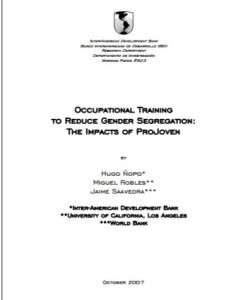Occupational Training to Reduce Gender Segregation: The Impacts of ProJoven
| Year | : | 2007 |
|---|---|---|
| Author/s | : | Hugo Ñopo, Jaime Saavedra, Miguel Robles |
| Area/s | : | Employment, productivity and innovation, Ethnicity, gender and citizenship, Methodologies for research and evaluation of policy and programmes |
Ñopo, Hugo; Jaime Saavedra-Chanduví y Miguel Robles (2007). Occupational Training to Reduce Gender Segregation: The Impacts of ProJoven. Research Department Publications 4553, Inter-American Development Bank, Research Department.
The paper discusses program evaluation for ProJoven, the Peruvian youth labor training program. Complementing detailed fieldwork, the econometric work implements a two-stage matching procedure on propensity scores, gender and labor income. This allows identification of differentiated program impacts on males and females and attacks the problem of Ashenfelter’s Dips. The evaluation shows substantial differences in ProJoven’s impact for males and females. Eighteen months after participation in the program, employment rates forfemales improve by about 15 percent (while employment for males reduces by 11 percent), gender occupational segregation reduces by 30 percent, and females’ labor income improves by 93 percent (while males’ earnings increase by 11 percent). Nonetheless, gender equality promotion represents only 1. 5 percent of ProJoven’s budget. These results suggest that labor-training programs that promote equal gender participation have disproportionately positive effects on outcomes for women trainees in a labor market with substantial gender differences.







